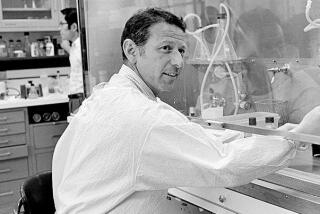Youthful Biotech Industry Struggles Toward Maturity
- Share via
For most of the 15 years since the term biotechnology burst into the public consciousness, the “industry” has been little more than hype and hope. The first of the hoped-for products have finally made it to market, but biotechnology is still a very young industry--at most a toddler finding its way on still wobbly legs.
Biotechnology is “nowhere close to a mature industry,” said Howard E. (Ted) Greene, former chairman of Hybritech Inc. and now a principal in Biovest Partners, a San Diego venture capital firm. “We’re still riding a growing wave of biotechnical research that won’t play out for another 10 to 20 years.”
Friday’s announcement that Roche Holding Inc. agreed to invest $2.1 billion in Genentech and acquire 60% of its stock highlights both the opportunities and the hurdles the industry faces en route to maturity. Further consolidation is certain, analysts said, for the same reasons that many traditional pharmaceutical companies have recently merged: The tremendous expense of bringing drugs to market.
The news of the agreement for Roche to invest in Genentech boosted several biotech stocks Friday. Amgen Inc. rose $4 per share to close at $48.75. Chiron Corp., another California-based firm among the industry leaders, closed at $26.375, up $2.625.
“The Genentechs of the world need the Roche’s of the world for capital,” said G. Steven Burrill, chairman of Ernst & Young’s San Francisco-based biotechnology consulting group. Consolidation on a smaller scale had already begun. And, Burrill said, he expects the large European and Japanese pharmaceutical companies to buy into more U.S. biotechnology firms.
The European giants are “flush with cash,” said Steven B. Gerber, an analyst with Bateman Eichler, Hill Richards in Los Angeles. “It’s becoming increasingly difficult for the independent biotech firms to raise funds and those companies (consume) a lot of capital,” he said. The financial markets for raising capital are not terribly accessible today, and the new issues market is particularly “not too healthy,” he said.
The biggest problem for the industry is clearing regulatory hurdles, Burrill said. “Unlike other fields, the technology doesn’t go directly to customers,” he said. “Companies may never see customers if they don’t get their products through the regulatory process--the FDAs (Food and Drug Administration) of the world. The regulators are the gatekeepers of the industry. This is not meant to be negative (and) not to say there shouldn’t be regulation. But the process is taking a long time and this is increasing the cost of bringing drugs to the market dramatically.”
Analysts estimate that it takes from $150 million to $250 million to bring a single drug to market. For the same amount that large pharmaceutical firms invest over a couple of years in research and development, they can buy a company with a promising product, Gerber said.
Venture capitalist Greene noted that traditionally small technology firms, particularly in medicine, have been purchased by bigger companies. “Genentech has remained independent a lot longer than average,” he said.
U.S. firms still lead the world in biotechnology, but the Japanese in particular have aggressively entered into marketing, research and equity agreements with about 250 U.S. biotechnology companies. Late last year, Chugai Pharmaceutical Co. Ltd. bought San Diego-based Gen-Probe outright for about $115 million.
A relatively few biotechnology products have made it to market, but Burrill said the industry is about where it was expected to be in the 1990s. The most promising products were not expected to make it to market before the 1990s, he said.
The industry should grow much larger in the 1990s than the current $2 billion in revenues as biotechnology plays a bigger role in formulating new drugs. Biotechnology drugs are not replacing traditionally formulated drugs, Burrill said. “Most of the new biotech drugs are creating new markets,” he said.
Genentech is considered the largest in the industry, but analysts said there has been some blurring of definitions of biotechnology and pharmaceutical companies. In the past five years, Greene said, biotechnology companies have emerged doing research focusing on chemical engineering technology rather than gene splicing technology or the cell fusing techniques that have led to new antibiotics. These recent companies look more like traditional pharmaceutical companies that rely on chemical research, he said.
Among the biotechnology firms analysts and other observers consider to be industry leaders is Amgen Inc. of Thousand Oaks, which won FDA approval of erythrpoietin, or EPO, a gene-spliced version of a naturally occuring protein in the kidney that triggers production of red blood cells.
The drug was approved to treat kidney disease patients suffering from chronic anemia. But Amgen’s prospects are clouded by a patent dispute with Genetics Institute of Cambridge, Mass., another leading biotech firm. Amgen and Genetics Institute hold different patents on EPO.
KEY BIOTECH MERGERS
* Eli Lilly bought Hybritech of San Diego for $485 million in March, 1986
* Bristol-Myers acquired Genetic Systems of Seattle for stock valued at $294 million in February, 1986
* Chugal Pharmaceutial bought Gen-Probe of San Diego for $110.6 million in November, 1989.
More to Read
Inside the business of entertainment
The Wide Shot brings you news, analysis and insights on everything from streaming wars to production — and what it all means for the future.
You may occasionally receive promotional content from the Los Angeles Times.










